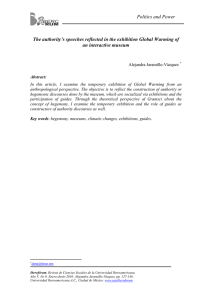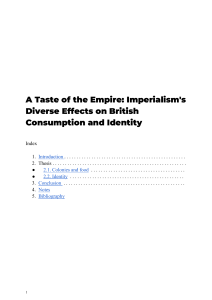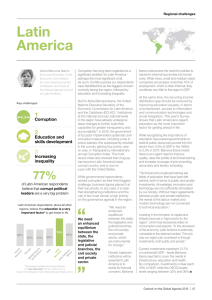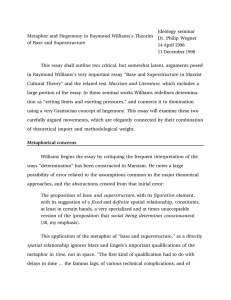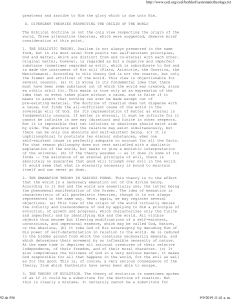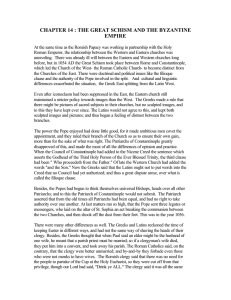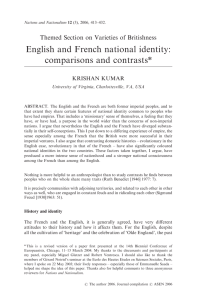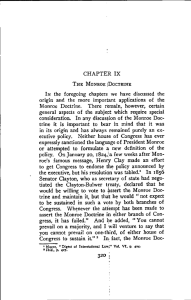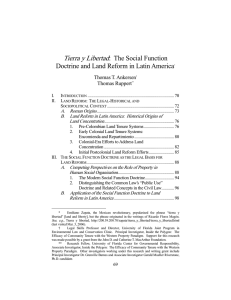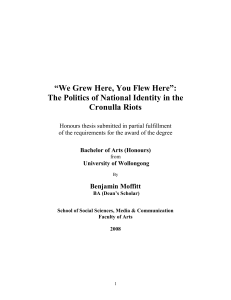The New Empire and the New US Hegemony Titulo
Anuncio
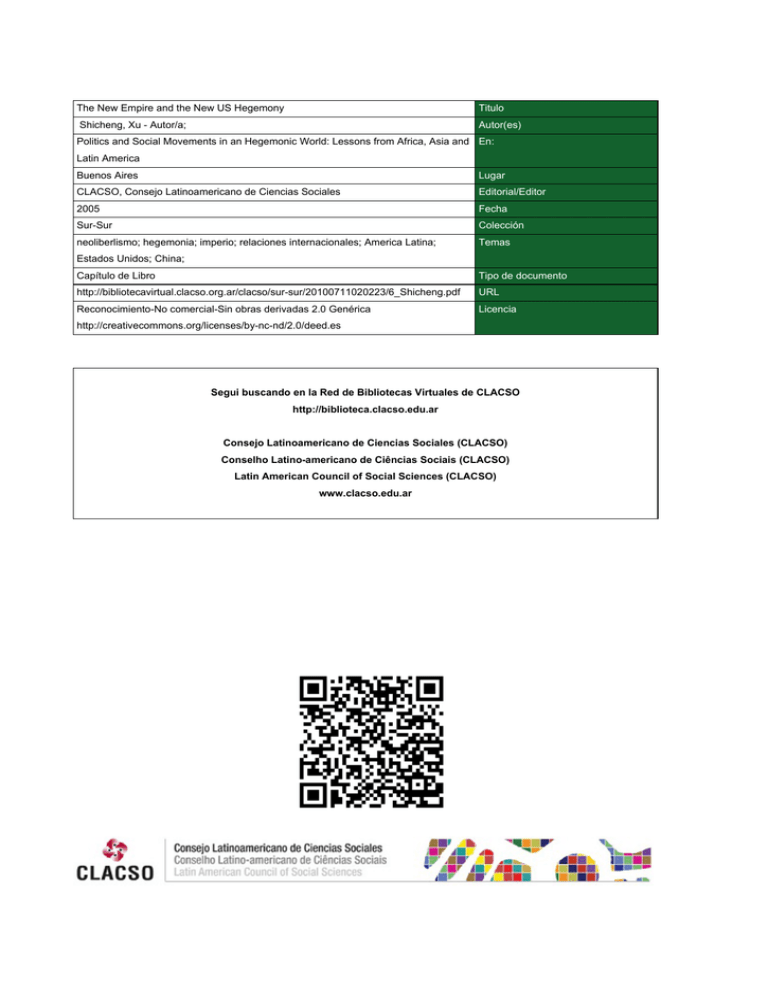
The New Empire and the New US Hegemony Titulo Shicheng, Xu - Autor/a; Autor(es) Politics and Social Movements in an Hegemonic World: Lessons from Africa, Asia and En: Latin America Buenos Aires Lugar CLACSO, Consejo Latinoamericano de Ciencias Sociales Editorial/Editor 2005 Fecha Sur-Sur Colección neoliberlismo; hegemonia; imperio; relaciones internacionales; America Latina; Temas Estados Unidos; China; Capítulo de Libro Tipo de documento http://bibliotecavirtual.clacso.org.ar/clacso/sur-sur/20100711020223/6_Shicheng.pdf URL Reconocimiento-No comercial-Sin obras derivadas 2.0 Genérica Licencia http://creativecommons.org/licenses/by-nc-nd/2.0/deed.es Segui buscando en la Red de Bibliotecas Virtuales de CLACSO http://biblioteca.clacso.edu.ar Consejo Latinoamericano de Ciencias Sociales (CLACSO) Conselho Latino-americano de Ciências Sociais (CLACSO) Latin American Council of Social Sciences (CLACSO) www.clacso.edu.ar Xu Shicheng* The New Empire and the New US Hegemony New US Empire During the post-cold war, especially after the September 11 terrorist attacks, in the western countries, and mainly in the United States, an ideological current has risen: the New Empire or Neo-Empire doctrine. This doctrine establishes new points of view on how to face the new world situation and the new security threats: terrorism, weapons of mass destruction (WMD), etcetera. One of the first to bring forth the doctrine of the New Empire was Robert Cooper, foreign policy advisor to Britain’s Prime Minister Tony Blair. His most representative work is the article entitled “Why we still need Empires”, published in The Observer on April 7, 2002. After September 11, in public debates in the United States the terms empire and imperialism stop being pejorative. Some consider that the New Empire is on the rise under the Bush Administration. Through a series of foreign and Defense policies, the New Empire has stopped being cheap talk and turned into the theoretical basis of a great US strategy and of Bush’s doctrine. The New Empire doctrine predominant in the US arises from the country’s own interests, and is different from Robert Cooper’s in England. The New American Empire doctrine attempts to transform the world by applying US values and establishing an American Peace, taking advantage of the incomparable advantages of its political, economic and military power. The Neo-American Empire is made up of the following elements: - The United States is currently the most powerful country in the world since the disappearance of the Roman Empire. It is the only superpower/world power that can take on the role of leader of the New Empire. - Important changes have occurred with regard to worldwide security, and the United States faces completely new threats. - Traditional methods can hardly restrain the new threats. The US must find new methods, or in other words, the New Empire policies to protect itself and obtain world stability under the single-pole American hegemony. G. John Ikenberry, professor at the University of Georgetown, analyzed and summarized the doctrine of the New Empire predominant in recent years in his article “America’s imperial ambition”, written to commemorate the first anniversary of September 11. He thinks that this neo-imperial theory constitutes “a new great strategy that is taking shape”: its initial and most direct impulse is the reaction to terrorism, but it also constitutes a more global vision of how the United States will be less tied to its partners and to global regulations and organisms, being determined to play a more unilateral role and set on confronting terrorist threats and face the villain states striving to obtain WMD. The United States will employ its military power to control the world order. Ikenberry has summarized this strategy in the following seven elements: - Maintain a single-pole world in which the United States has no competitor at its level. - A recent and alarming analysis of worldwide threats and how they should be confronted. - The dissuasive concept typical of the Cold War is no longer applicable. The old defensive strategy of building missiles and other weapons that can survive a first attack will no longer guarantee security. The only option then is to take the offensive. - A redefinition of what sovereignty is. Since terrorists do not respect frontiers, the United States cannot do so either. 69 - A general depreciation of regulations, treaties and international security associations. - A need to act in a direct manner and without limitations in response to threats. No other country or coalition has the capacity to project forces to respond to threats. - Not to grant great value to international stability. The old and traditional realistic and liberal strategy is useless to solve the security problem that the United States faces, and should be discarded1. Origins of the Neo-Empire Doctrine The terrorist attacks of September 11 made Americans change their way of thinking: the United States is not isolated from the world; problems in other parts of the world can threaten and affect US security and interests sooner or later. Therefore, the United States should not react passively: it has to establish a safe atmosphere and a world order favorable to American interests and way of life. The position of conservative forces prevails in the United States, especially that of the new conservative tendency in political and social life, which tends to adopt a unilateral and offensive strategy. The growing economic and military power of the United States after the Cold War constitutes the material basis and starting point of the neo-imperial doctrine. As it grows stronger, the elite and the authorities of the United States have successively changed their statements about their role in the world. At the beginning of the 90s, they said that “the United States led the world”. In the middle of the 90s, that “the United States would play an advantageous and leading role in the world”. In the late 90s they said that “it would play the most important role in the world”, and after 9/11 they said without restrictions that “the United States would have the influence of an empire”. Consciousness of “the savior mission” and “the Liberty Empire” constitutes the ideological origin of the Neo-Empire doctrine. The important changes in the international situation constitute the atmosphere and the international essence of the origin of the New Empire doctrine. The disintegration of the USSR led to the critical imbalance of the international system and made the American promotion of the Neo-Empire policy possible. The huge changes in the international security structure and the upgraded realization by the United States of the threats it faces made the Neo-Empire policy necessary. The policies set forth by the neo-imperial doctrine clearly reflect the colors of traditional imperialism, characterized by the use of force, the search for hegemony, and absolute security. They include typical elements of the neo-imperial doctrine such as unilateralism, the definition of Axles of Evil, anticipated attacks, etc. If neo-imperial strategy turns into the main trend of American foreign policy, American hegemonic policies will be even more unrestrained and ruthless. The war launched by the United States against Iraq marked the beginning of the application of its global strategy to build the neo-empire. The United States felt powerful enough not to let its interests be pulled either by diplomacy or by its allies. New American Hegemony The following aspects characterize the new American hegemony: 1. The imbalance in the correlation of international forces motivates the hegemonic ambition of the United States. 2. To an extreme degree, American interests are placed above all. For the United States, its interests have neither frontiers nor limits, and spread all around the world. In reality, they are hegemonic interests. 3. The new American hegemony seeks a global hegemony that takes up all aspects. In other words, a political, military, economic, cultural and judicial hegemony. Politically, the United States intervenes in domestic affairs, and attempts to impose its political system, ideology 70 and values on other countries. Economically, it seeks to direct the international economic order through the IMF, WB, FTAA and other institutions. Militarily speaking, by appealing to its military advantages, it threatens and attacks countries considered defiant and risky. The New American Hegemony and Latin America After 9/11, the United States is reinforcing its strategy to control Latin America. It is intensifying its military, political and economic relationships with the Latin American countries in general, and specifically with the Andean ones. It provides military support for Colombia and other countries in the region, and extends its military presence under the pretext of fighting terrorism and drug smuggling and through the Colombia Plan, the Andean Region Initiatives and the Andean Commerce Promotion Law. After the war against Iraq, the United States is increasing its support for Colombia and for Central American countries, which backed it in the war against Iraq. Upon president Bush’s invitation, the presidents of the Dominican Republic and of the Central American countries visited the United States. Bush expressed his desire to promote the free trade treaty with Central American countries, including the Dominican Republic. The United States has shown displeasure with Chile and Mexico for their express position of not supporting the United States in its war against Iraq. Regarding its economic and commercial relations with Latin America, the United States is accelerating its steps to sign the FTAA treaty with the Latin American countries in early 2005. With the FTAA, the United States intends to control the Latin American economy. Nonetheless, the United States continues with its commercial protectionism practices by increasing its subsidies on agricultural products and imposing custom taxes on imported rolled steel. With regard to the problems concerning the fight against drug smuggling and terrorism, several Latin American countries oppose the sending of American armed forces to Latin American countries in order to intervene in their domestic affairs by using the excuse of helping them fight drug smuggling and terrorism. Cuba refutes over and over the United States’ classification of it as one of the countries sponsoring terrorism. The United States rejects signing a bilateral treaty against terrorism with Cuba, while at the same time directly or indirectly performing subversive and sabotage activities to overthrow the current Cuban government. The Bush administration keeps applying a harsh policy against Cuba. The United States accuses Cuba without any foundation whatsoever, saying that Cuba is experimenting with biological bombs. Bush claims over and over that the United States will continue the blockade against Cuba unless the latter holds “free and fair elections”, frees all political prisoners, and allows opponents to carry out their activities and form political parties legally. The United States continues to enforce the Cuban Adjustment Act to stimulate illegal Cuban emigration. It openly supports and finances Cuban counter-revolutionary groups, and is setting up a worldwide anti-Cuban campaign. Mexico and the Central American countries criticize the United States for taking so long to sign the treaties regarding the immigration problem with them. In its annual report on the human rights situation, the United States accuses Mexico, Panama, Cuba, Haiti and other Latin American countries, criticizing them for not respecting human rights. However, these countries have energetically rejected the accusation of the United States. There are contradictions between the United States and the Latin American countries on problems related to commerce, war on terrorism and drug smuggling, immigrants and human rights. The new American hegemony pretends to control Latin America politically, economically, ideologically and militarily, but faces even stronger resistance from the Latin American countries. The New American Hegemony and China After the triumph of the Chinese revolution, for a long period the United States applied a hostile policy towards China: military threats, economic blockades, commercial embargoes, and diplomatic isolation. In 1979, thirty years after the foundation of the Popular Republic of China, the United States and China established diplomatic relations. Notwithstanding, the United States essentially has not changed its harsh policy towards China. Chinese-American relations 71 develop in a zigzagging manner. The United States currently applies a “contact plus contention” policy towards China. After the abrupt changes experimented by the Eastern European countries and the disintegration of the USSR in the late 80s and early 90s, Chinese-American relations have gone through three stages: first, the sanctions and counter-sanctions stage (1989-1992); then, the pressure and counter-pressures stage (1993-1996); finally, the contact and cooperation stage (1996). The problems related to Taiwan, human rights, and religious and commercial conflicts, have not been solved with the exchange of officials’ mutual visits, the development of commercial relationships or a certain cooperation in the fight against terrorism. Former president Bill Clinton termed China a “strategic partner”. Changing the rhetoric, George W. Bush terms China a “strategic competitor”. The truth is that bilateral relations are still very fragile and volatile. The United States keeps applying its “peaceful evolution” strategy towards China, that is to say, seeks to have China “change its color”. Here is an example: the Rand Corporation recently published a plan to destroy China. The intentions of the new American hegemony to change the color of Socialist China will fail. The intentions of the new American hegemony to change the color of Socialist Cuba will fail. The intentions of the new American hegemony to control Latin America and the world will fail. China’s position is very clear: “All forms of hegemony and the policy of force need to be combated. China will never attempt hegemony or expansion”2. Notas * Researcher and Professor of the Institute of Latin America, China´s Social Sciences Academy. 1 Ikenberry, G. John 2002 “America’s Imperial Ambition” in Foreign Affairs, September/October. 2 Jiang Zemin, report presented at the XVI National Congress of the Communist Party on November 8, 2002, Beijing, China. 72
